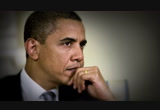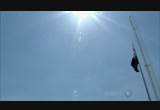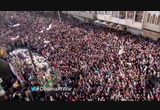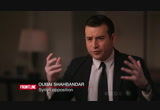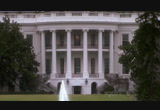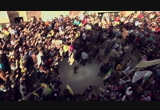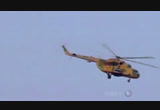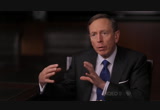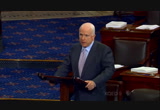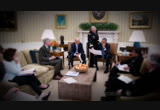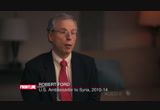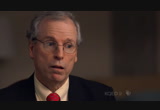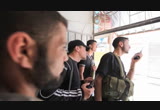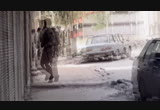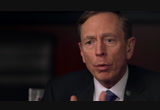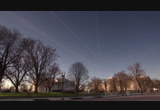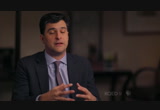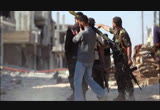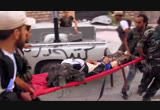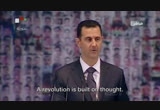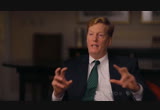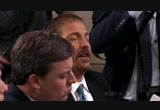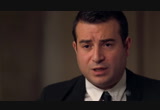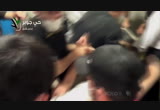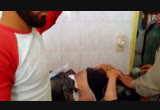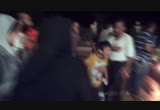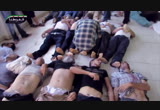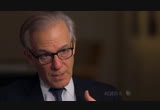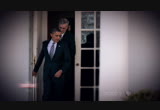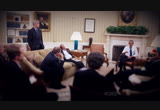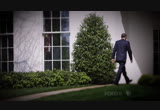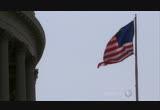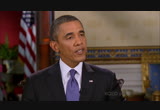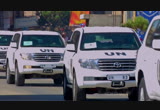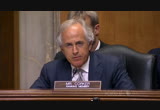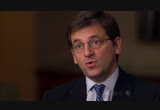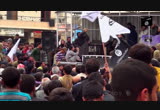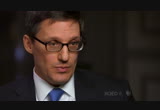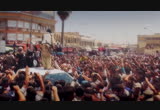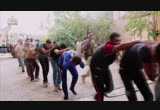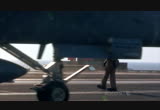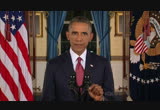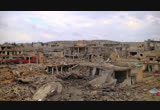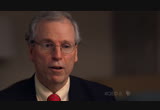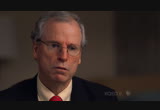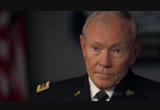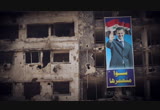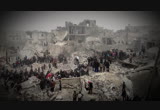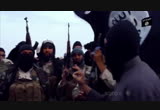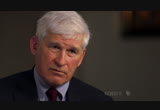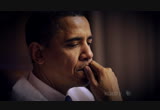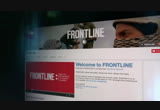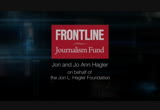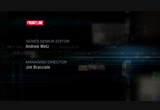tv Frontline PBS November 30, 2017 4:00pm-5:01pm PST
4:00 pm
>> narrator: tonight on frontline... >> president obama found himself exactly where he didn't want to be. >> narrator: the president decides to draw a line. >> a red line for us is chemical weapons being utilized. >> narrator: and then decides to pull back. >> it was all in motion, and at the last minute, the president blinked. >> i will seek authorization from congress. >> extremists were sending the message to the locals that, look, you've been betrayed by the united states and its regional allies. >> narrator: frontline investigates the choices the president faced as syria descended into war. >> the president is troubled by the outcome. he can't help but look at 200,000 dead syrians, the rise
4:01 pm
of isis that is now extending to far places in the middle east. >> we will degrade and ultimately destroy isil. >> obama was elected to end wars, not begin them. >> narrator: tonight, "obama at war." >> frontlinis made possible by contributions to your pbs station from viewers like you. thank you. and by the corporation for public broadcasting. major support for frontliis provided by the john d. and catherine t. macarthur foundation, committed to building a more just, verdant and peaceful world. more information is available at macfound.org. additional support is provided by the park foundation, dedicated to heightening public awareness of critical issues. the ford foundation, working with visionaries on the front lines of social change
4:02 pm
worldwide. at fordfoundation.org. the wyncote foundation. and by the frontline journalism fund, with major support from jon and jo ann hagler. corporate funding for frontline is provided by... >> whether it's discovering an aspirin a day can prevent heart attacks worldwide, or creating cells that regenerate new heart muscle, our goal is developing treatments that save lives. brigham and women's hospital. >> martin smith: syria, january 2011.
4:03 pm
the arab spring was sweeping across the region. >> thousands of demonstrators... >> a huge step towards democracy... >> smith: a new u.s. ambassador, robert ford, was just arriving in damascus. >> democracy taking place in a lot of these countries... >> demanding change, they're fed up... >> smith: at the time, it seemed syria's dictator would be next to fall. >> protesters in tahrir square drove hosni mubarak out of power... >> mubarak actually left power in cairo the weekend after i got there. and in my first meeting with bashar al-assad, i asked him point blank, "looks like kind of a difficult time for authoritarian regimes. what kinds of steps are you thinking of to get ahead of the problem?" and he kind of brushed it aside and said, "it'll never happen here." not three weeks after that meeting, the arab spring started in the haria market in damascus. >> the uprising of the syrian
4:04 pm
people was a secular one. one of its slogans was, "wahed, wahed, wahed." >> smith: one, one, one? >> one, one, one. "we are united." >> this is an uprising of the syrian people against a dictatorship. >> wahed, wahed, wahed! >> smith: within a matter of weeks, tens of thousands more syrians joined the protests. ambassador ford, with washington's backing, supported them. >> right from the beginning, ford was out there trying to give them the encouragement of our senior diplomat on the ground saying, "this is quite exciting." >> we were not backing any particular set of demands that the protesters were putting forward. we were simply supporting their right to demonstrate peacefully. >> i remember ford bravely
4:05 pm
traveling to the cities where this sunni revolution was taking place, at some danger to himself. >> the syrian protesters were just very surprised that i came. they surrounded our car. my bodyguard was very afraid. >> but when the people saw that the american ambassador was coming, they came up to his car and were throwing flowers, they were throwing olive branches. they were excited. the americans were here, they were showing their solidarity. >> they were happy that the international community was paying attention to them. they believed that my presence would deter the government from sending in security forces which they said would create havoc and violence. >> smith: but just a few weeks after ambassador ford's visit
4:06 pm
to hama, where assad's father crushed an uprising 29 years earlier, assad attacked. (gunfire) (shouting) >> smith: in washington, president obama was watching. >> the syrian regime has chosen the path of murder and the mass arrests of its citizens. the syrian people have shown their courage in demanding a transition to democracy. president assad now has a choice: he can lead that transition or get out of the way. >> smith: the question was, what was the president going to do next? >> the syrian government should stop shooting demonstrators and allow peaceful protests. >> president obama wants to use his moral power to the extent that he has some by calling for assad to leave, but he doesn't believe it's america's
4:07 pm
responsibility to directly stop him. >> smith: there was also a feeling inside the administration that perhaps they didn't need to do much anyway. >> you'd seen what happened in egypt, in tunisia, in libya, and the feeling was that the popular demonstrations would ultimately bring down the regime. >> everybody believed that. everybody believed it. look, the israeli defense minister said that assad was gonna go in a matter of weeks. the head of the muslim brotherhood said three months. everybody, the turks believed it. everybody thought this little assad minority, very narrow regime, was just gonna crumble as soon as people rose up. (shouting) (chanting) >> smith: but assad did not crumble. (gunfire)
4:08 pm
>> the syrian regime had clearly decided that it could crush the protests, really using brutal force with impunity. (gunfire) >> allahu akbar! >> and then people began to arm, because they didn't know what else to do. >> smith: assad countered the rebels with helicopter gunships... (rapid gunfire) long-range artillery... (explosion) ...and eventually, bombers. (explosions) >> and the opposition leadership sent a message to the capitals of the west, that this is only going to get worse. the assad regime is not going to stop. (explosion)
4:09 pm
(screaming) >> smith: back at the white house, they discussed their options. they listened to revised cia assessments about the regime's strength. cia director david petraeus noted that the regime's shia allies, iran and hezbollah, were rallying to assad's side. >> there seems to be a process by which iran is airlifting aid into damascus. (explosions) you see the growing involvement of lebanese hezbollah. and you see the revolutionary guards corps, quds force leaders making a very, very important contribution to shoring up the regime forces. >> smith: as the fighting intensified, political pressure was building. >> after a year of bloodshed,
4:10 pm
the crisis in syria has reached a decisive moment. it's estimated that more than 7,500 lives have been lost. >> smith: senator john mccain was calling for u.s. airstrikes in syria to create safe havens for syrian rebels. >> the united states should lead an international effort to protect key population centers in syria, especially in the north, through airstrikes on assad's forces. i told the president, i said, "bashar assad is slaughtering people. we are watching genocide take place. and it is going to eventually destabilize the entire region." >> smith: this president looks out at the landscape and doesn't see reliable partners. why should we be getting involved in this? >> well, i'm not saying there are any real easy options, and i'm not saying it's not complex. but i do not believe that we needed to end up in a situation
4:11 pm
that we are in today. >> smith: if bashar al-assad was to be toppled, who would replace him? >> i think that would be a very difficult thing to sort out. >> smith: in the president's view, it would be very difficult to sort out. the u.s. had just gone into libya months earlier and toppled qaddafi only to see chaos ensue. and mccain's suggestion of creating safe havens in syria was a tall order. president obama asked the chairman of the joint chiefs of staff, general martin dempsey, for a briefing. >> so dempsey gives a presentation, and everyone's jaws drop. he basically says that it's going to take roughly 70,000 u.s. personnel, not boots on the ground, but total u.s. personnel involved in this effort that would, you know, knock down syrian air defenses and be able to provide air cover for the rebels. and some began to suspect that he had inflated the figure because he didn't want to do it. >> you're talking about taking
4:12 pm
down a country that has a very sophisticated, at that time, a very sophisticated, russian-provided, integrated air defense system. and it would have been a sizable undertaking. >> smith: the president was also briefed on legal issues involved in attacking a sovereign government. >> what was put forward was that it would violate international law, helping an opposition group to a government which was recognized as sovereign by the united nations. >> smith: the president was forced to think hard about the limits of american power, and the limited appetite of the american people for more war. >> look, the american people do not support action in syria. >> smith: and the president had other priorities. >> he had a terrible economic disaster that had gone off in america, and he needed to do obamacare. he had to focus on what he was trying to get done here.
4:13 pm
>> smith: but there was still pressure on the president to do something. ambassador ford flew in from damascus and warned that there were other ominous developments. >> we were beginning to hear by the end of 2011 about groups coming in, especially from iraq, of extremists connected to al-qaeda. and what concerned the more moderate opposition people with whom we were in contact were that these groups were very well financed and were gaining an advantage over the moderate elements. >> smith: and among these groups was what would eventually become isis. funding them was an array of wealthy sunnis from saudi arabia, qatar, and kuwait. >> my team at the state department, and i think in the end, secretary clinton, agreed with this. we needed to make sure that the opposition, especially the armed
4:14 pm
opposition, was not dominated by extremists, but rather by more moderate elements. >> smith: but the moderates were very disorganized and outmatched. (gunfire) >> they were grossly outnumbered. president assad had 300,000 forces when this war started, and the rebels were in the hundreds. (explosion) and the one advantage that president assad has always had was airpower, something the rebels on the ground couldn't either fight or counter. (explosion) >> the problem was to identify at that time the so-called moderates who had the potential militarily to mount an effective resistance against the syrian regime.
4:15 pm
>> smith: in 2012, frontline sent a reporting team into syria's biggest city, aleppo. the ad hoc nature of the rebel militias was obvious. (explosions) >> smith: very few had any real military experience. (explosions) >> smith: president obama had to figure out which if any of these fighters could be trusted. >> he wanted to make clear that we had to be very deliberate and careful when it comes to
4:16 pm
something like providing military assistance to an opposition group. do we know that those arms aren't going to fall into the wrong hands and end up in the custody of a nusra front or an isil, for instance? >> smith: there was a lot of worry, was there not, about where would the weapons end up? >> there were very legitimate concerns. and what one tries to do in a situation like that is, again, gather as much information as possible, but recognize that at the end of the day, there are always going to be risks. there are no guarantees. there are no certainties. >> smith: there were no certainties, but in the summer of 2012, petraeus came up with a proposal. >> david petraeus, then the cia director, presents his plan that would be a cia covert action to secretly arm the rebels from bases in jordan.
4:17 pm
>> smith: petraeus's covert plan gave the administration plausible deniability if legal issues arose concerning the attempted overthrow of a sovereign government, or if the weapons turned up in the wrong hands. petraeus pressed ahead. >> and he finds allies in hillary rodham clinton and leon panetta, who was his predecessor at cia and now the defense secretary. and they push this idea, and they say, "it's time for us to get involved. we can't stay on the sidelines." >> my view was if we really want the rebels to succeed, the only way we could do that, the only way we were gonna get credibility with those that were fighting on the streets and dying, was to be able to provide the weapons they needed in order to confront assad. >> smith: the administration was deeply divided. recent history provided contradictory lessons. >> we were driven in part by our impulse learned in the balkans,
4:18 pm
about the necessity of u.s. intervention in the balkans to help end a humanitarian emergency, to help deal with brutal dictators. but also very mindful of the lesson we took from iraq, where the insertion of american power, the overextension of american power in iraq brought tremendous hardship onto the people of iraq, on our country. >> smith: perhaps the strongest advocate for arming the rebels was samantha power, head of obama's newly formed atrocities prevention board, and author of the pulitzer prize-winning book a problem from hell: america and the age of genocide. >> and one of america's responsibilities in the world, as she sees it, is to step in and help protect the powerless. to help in situations where people are being victimized by brutal and despotic regimes like that of bashar al-assad. so for her, syria is the balkans all over again and rwanda all over again, and she's advocating a more robust response.
4:19 pm
she's saying, "we can't let this go on without stepping in." >> smith: but inside the president's inner circle of advisors, which included national security deputy denis mcdonough, there was a lot of resistance. >> and she ran into a brick wall, primarily with denis mcdonough, one of the strongest voices in the administration for not, you know, getting directly involved militarily in syria. >> smith: throughout the summer and fall of 2012, officials in the white house met as often as twice a week, trying to decide who, if anyone, to back. some people would say we're simply not nimble enough to be engaged in these kinds of conflicts-- that the saudis, the qataris, the kuwaitis, the emirates, turks, were aiding other rebel groups. >> that's absolutely true. >> smith: and we were sitting around, having an ongoing conversation that one aide described to us as groundhog
4:20 pm
day. >> yeah, that's one of the challenges that we have, but it's also one of the strengths of our system, is that we are a nation of laws, and that when it comes to providing particularly lethal assistance particularly to non-state actors, we need to find a way that we can do that within the bounds of our laws. >> i think sometimes, we think that our ability to impose order and solutions on very complicated situations in the middle east causes us to act without necessarily thinking through the second, third, and fourth-order consequences of action. (gunfire) >> they want to help the good syrians who are getting massacred. who doesn't want to do that? but when it comes down to responsibility for if you arm these militias and you say, "i'm gonna make them win," you can't let them lose if they're no good. you have to make them win. and then you're gonna get sucked
4:21 pm
in, and it's a big slippery slope. (gunfire) >> and a slippery slope was defined as kind of dragging us down into where we might end up having to use u.s. direct military action. >> smith: in the fall of 2012, aleppo was still up for grabs. but rebel forces were taking heavy losses. the president made up his mind. >> the message came back that the president was not convinced that the state department and the cia proposal was a good one, and he would not support it. >> smith: you felt you'd failed to make the case? >> yeah, i mean, we were disappointed obviously. >> smith: you were angry, i imagine? >> frustrated would be a better word. >> smith: frontlimade repeated attempts to interview samantha power and other current officials in the white house. our requests were denied.
4:22 pm
(cheering) >> smith: in early 2013, assad appeared in public for the first time in six months to address his supporters. >> smith: as he said this, his air force was hitting schools, hospitals, and bread lines. >> smith: after two years of war, more than 60,000 syrians had been killed... (shouting) ...and hundreds of thousands forced to flee their homes.
4:23 pm
refugee camps in jordan, lebanon and turkey were overflowing. russia and iran were continuing to send arms to the regime, but very few governments in the west wanted to get involved in arming the rebels. >> nobody cares about syria. it's got no gas, no oil, no riches of any kind. everybody talks big, "humanity, saving life," but we're all aiding this terrible civil war. >> smith: with no one to stop him, assad initiated a new phase in the war: the deployment of chemical weapons. >> the assad regime calculated that their use of chemical weapons would strike terror in the hearts of the civilians. (gunfire) >> and it would ultimately rob
4:24 pm
the rebel forces of the civilian populace which it needed to operate. so it was very calculated and it was very shrewd and it was very, very cynical. >> smith: a few months earlier, the president was holding a routine press conference about campaign finance, medicare, and afghanistan. then came the last question of the day. >> chuck todd. >> mr. president, could you update us on your latest thinking on where you think things are in syria, and in particular whether you envision using u.s. military? >> smith: in his response, president obama brought up assad's prospective use of chemical weapons. >> we have been very clear to the assad regime that a red line for us is we start seeing a whole bunch of chemical weapons moving around or being utilized. that would change my calculus. that would change my equation. >> that was not, apparently, a planned thing; he said it in response to a question from a reporter who was asking about
4:25 pm
the use of chemical weapons. >> and that there will be enormous consequences if we start seeing movement on the chemical weapons front. >> some of the aides, in fact, who heard him say this were surprised. they didn't know where that phrase had come from. >> thank you, everybody. >> smith: but the president's impromptu threat pleased the syrian opposition. >> it was encouraging. the fact that you had the president stand up and make it very clear that any use of chemical weapons would be a red line for the first time indicated that there is a potential opportunity here for the united states to intervene. >> smith: but in spite of the president's threat, assad was defiant. >> initially, they were isolated incidents, and then it became a pattern of larger use... (explosion) >> ...and multiple attacks in a concentrated area.
4:26 pm
>> and so through the spring, there are these provocations that go basically unanswered. >> and in hindsight, it looks like anyway bashar al-assad was testing and pushing and seeing how far he could go, where this red line really was drawn. (screaming) >> the administration understood as the regime escalated its use of chemical weapons that we would have to do more ourselves in response to that. >> and you saw john kerry, the new secretary of state in 2013, becomes a very active voice in this debate. >> smith: on june 12, 2013, obama huddled with kerry and others in the white house to discuss their response.
4:27 pm
>> so secretary of state kerry goes to that meeting in june of 2013 with talking points laying out the worsening situation. the intelligence community was assessing that, you know, the rebels were really on the ropes. you have the clear proof within the intelligence community that there had been chemical weapons attacks. and i think there was this feeling among the president's advisors that it was time to do something and to say that they were doing something. so there is a public announcement by the administration that they've made a decision to start arming rebel groups. it was still a pretty cautious plan, but it was a plan to begin arming the rebels. >> the president's decision to increase support for the syrian opposition, those are decisions that he's made over the course of the last several weeks, particularly as our assessment of chemical weapons use firmed up and as we saw the deteriorating situation in general. >> but the weapons that were
4:28 pm
sent in were very limited. the number of fighters who were going through those training camps in jordan was so limited, it just didn't make much difference. >> smith: then a sarin gas attack on a rebel-held suburb of damascus. (shouting) >> smith: sarin is a nerve agent that causes lung muscle paralysis and results in death from suffocation. >> 1,400 men, women and children are killed according to what the american intelligence agencies tell the president. at this point, the president can't ignore it.
4:29 pm
he has to have some sort of response. he has drawn this red line, he may be trapped by it, but he understands that his credibility and the credibility of the united states are on the line. >> the indiscriminate slaughter of civilians, the killing of women and children and innocent bystanders by chemical weapons, is a moral obscenity. president obama believes there must be accountability for those who would use the world's most heinous weapons against the world's most vulnerable people. >> smith: the president ordered the military to get ready. >> so down at central command in tampa, they were drawing up possible targets. they had lists of what could be hit on the first day, what could be hit on the second day. >> smith: the consensus was that the pentagon would launch
4:30 pm
strikes on saturday, august 31. >> our finger was on the trigger. we had gone through the targeting plans and the targeting solutions. the crews were alerted. and so we had everything in place, and we were just waiting for instructions to proceed. >> and the threat of u.s. action was enough to, you know, have a significant effect on the ground. it was noted all over the arab world that suddenly, people in the regime were panicking. >> but obama's having second thoughts. he's feeling alone. his friends in britain say, "yes, we're with you," but then parliament says, "no, we're not." >> it's clear to me that the british parliament, reflecting the views of the british people, does not want to see british military action. i get that, and the government will act accordingly.
4:31 pm
>> it was a friday night, and i got a call from the president of the united states, and he said to me, "i am considering an alternative course of action," and he wanted me overnight to consider whether a delay would in any way affect our ability to be effective with our military options. >> smith: the next morning, obama summoned his long-time foreign policy advisor, now chief of staff, denis mcdonough. >> and he goes for a walk on the south lawn with mcdonough, and they circle this pathway again and again and again for 45 minutes, talking about what to do. and the president tells him, "i've got this idea. why don't we go to congress and ask them to approve a strike?" what he's looking for is buy-in. >> as near as we c can tell, he worried that he didn't have sufficient political support for, you know, what might be
4:32 pm
a long-running conflict. >> the president was looking for a way to not have to make good on the threat that he had made, i think because the president, having drawn that red line, realized that he had no appetite for direct military engagement in syria. >> so he comes back in from this walk with denis mcdonough and he tells some of his other advisors, and they can't believe what they're hearing. this is a crazy idea as far as they're concerned. "if you go to congress," they tell him, "and you lose a vote like this, it would be devastating to your political standing." and they push back. and he held firm. >> smith: a few hours later, the president called a press conference in the rose garden. >> after careful deliberation, i have decided that the united states should take military action against syrian regime targets. but having made my decision as commander-in-chief based on what
4:33 pm
i am convinced is our national security interests, i will seek authorization for the use of force from the american people's representatives in congress. >> at the time, you know, he was describing it as seeking strong political support for this decisive move. he had all the rhetoric of action. but in truth, it was stepping back from the imminent attack that was ahead. you know, it was all in motion, and at the last minute, the president blinked. >> i was there in southern turkey at that time, and i can tell you that the syrian people were looking at the skies, hoping that the united states air force would come to the rescue. and then all of a sudden on september 1, the syrian people woke up and realized that the united states was not going to come to the rescue. >> not only did the syrians believe this, the french armed forces were mobilizing. they were ready to go ahead, and they stopped at the last
4:34 pm
minute when they heard that the president is going to ask for congressional authorization. >> i mean, this is in some ways the riskiest decision certainly in foreign policy that he's made of his presidency. and he's put his credibility in the hands of a congress that doesn't like him. >> smith: congress was in recess. then, on the very day they were set to reconvene... >> suddenly comes up this bolt from the blue, in effect: a russian proposal to avoid a strike by getting syria to agree to give up its chemical weapons. >> mr. secretary, in that cbs interview that you just referenced, bashar al-assad... >> smith: it began when a reporter in london asked secretary kerry how assad could possibly avoid a strike. >> he could turn over every single bit of his chemical weapons to the international community in the next week. turn it over, all of it, without delay and allow a full
4:35 pm
and total accounting for that. but he isn't about to do it, and it can't be done, obviously. >> smith: it was an off-hand remark, but it got the attention of russian foreign minister sergey lavrov. he contacted his syrian counterpart, who got assad to agree. obama went on network tv to sell the idea to the american public. >> this represents a potentially positive development. we are going to run this to ground. john kerry will be talking to his russian counterpart. we're going to make sure that we see how serious these proposals are. >> and so at the time, it seemed like a flyer. "what on earth are you doing? you're gonna really trust two of the people in the world we trust the least, vladimir putin and bashar al-assad?" but in the end, it worked. it became a diplomatic way out of a terrible situation that he had found himself in, that he had put himself in.
4:36 pm
>> but what if he had bombed? what if he had bombed and killed, let's say, 100 soldiers and blew up some intelligence centers in damascus? what would that have gotten him? that would've gotten him in the middle of a war. he said he was gonna deal with chemical weapons, which he did. and he did it magnificently. and without killing anybody, he managed to get those chemical weapons out of syria. >> it was the right decision. had we conducted the military campaign that had been planned, we would not have taken out a high percentage of his chemical weapons. the credible threat of force brought about an opening for diplomacy to come in, which then led to something that no one thought was possible. >> no, i think it was a terrible, terrible error on the part of this administration. i mean, it's not just a red line. this is the president of the united states, this is the white
4:37 pm
house, and a tin pot dictator challenges that and gets away with it? who's gonna believe you next time? >> mr. ford, thank you for coming before us today. let me just ask you this. the opposition that you know personally in many cases, are they faring better since we decided not to go ahead with military force than they were before this discussion began? >> they're deeply disappointed, senator, that we chose not to use military force. i have heard just anguish from people that i have talked to over there... >> smith: ambassador ford resigned his post in february 2014. he said he could no longer defend u.s. policy. (shouting) extremists exploited the decision not to attack. >> immediately afterwards
4:38 pm
in syria, extremists and what eventually came to be isis were sending the message to the locals that, "look, you have been betrayed by the world. do not trust those nationalist rebel forces that at this point were receiving nominal support from the united states and its regional allies." >> they make the argument to syrians, "you can't count on the americans. stick with us. we're the only ones who can take down assad and create a whole new order here." (explosions) >> when you're in a civil war and the side that's fighting you is droppg barrel bombs, killing indiscriminately, when it is using chemical weapons... (sirens wailing) ...and then someone comes to you and says, "we will help defend you against those people," i think it's human nature to seek the help of those who will
4:39 pm
defend you against this external threat that's killing you, arresting you, torturing you. is it really a surprise that syrian opposition and the people that support them would seek the help of anybody to get rid of the regime that is inflicting this pain? >> smith: by january 2014, many moderate rebels had joined with extremist groups. isis emerged as the strongest of the rebel armies. they had wrested control of the provincial capital raqqa in northern syria. the city of one million people became their capital. six months later, isis burst into public consciousness when they crossed the border back into iraq... (gunfire) ...and seized iraq's second-
4:40 pm
largest city, mosul. (explosions) sunni residents welcomed them. (cheering) >> smith: u.s. officials were blindsided. >> the fall of mosul was something that we had not anticipated, and the suddenness with which that fall occurred was something that was a shock. >> allahu akbar! >> they seized everything from small arms to light-armored vehicles to anti-aircraft weapons. when terrorists of this kind get their hands on weapons, it was a huge concern to us. i don't think we truly understood the depth of the problem until the fall of mosul. >> smith: for all the contingency planning that you routinely do here at the
4:41 pm
pentagon, were there plans for how to react to the fall of mosul to isis? >> well, no, there were not, because of course... so look, there were several things that surprised us about isil. the degree to which they were able to form their own coalition, both inside of syria and inside of northwestern iraq; the military capability that they exhibited, the collapse of the iraqi security forces. yeah, in those initial days, there were a few surprises. >> within the white house, the reaction was shock and concern that it looked like they were losing iraq. but there was very little action. mosul, the second-biggest city in iraq, even that was not
4:42 pm
enough to really motivate action. >> smith: facing little or no resistance, isis moved deeper inside iraq, capturing town after town. they chased thousands of christians, yazidis, shabaks, turkmen, and other minorities from their homes. in tikrit, the birthplace of sadaam hussein, they rounded up and massacred 1,700 shia soldiers and posted this video online. then in august, isis baited the u.s. by releasing this video. >> this is james wright foley, an american citizen of your country. >> today, the entire world is appalled by the brutal murder of jim foley by the terrorist group isil. >> the foley case really became
4:43 pm
the trigger, and all of a sudden, isis went from being an anonymous force on the ground far away to something that had a consequence here at home. >> i can announce that america will lead a broad coalition to roll back this terrorist threat. our objective is clear: we will degrade, and ultimately destroy, isil. >> smith: after trying for three years to keep america out of another mideast war, president obama entered the fight. america was back at war again. >> the perception at that point was that isis was a virtually unstoppable force. he felt compelled to act. >> smith: the president declared isis a threat to the region and to the u.s. >> we will hunt down terrorists
4:44 pm
who threaten our country, wherever they are. that means i will not hesitate to take action against isil in syria, as well as iraq. >> the president authorized air strikes not just in iraq, but actually in syria, which is something he had never wanted to do. and it's a huge expansion in some ways of our involvement. that's a big step for him. >> this is a core principle of my presidency: if you threaten america, you will find no safe haven. >> smith: the first big battle took place in a small syrian kurdish town on the turkish border, kobani. after isis invaded, a u.s.-led coalition responded with four months of airstrikes. (explosions) kurdish volunteers from iraq and syria provided the ground force against isis militants.
4:45 pm
kobani became a test of resolve for both obama and isis. 700 bombs later, the coalition did push isis out of kobani, but only by destroying half the town in the process. and since kobani, the war against isis in syria has been slow. isis has melted into the civilian population in aleppo, in raqqa, and in other syrian cities and towns. >> the way the forces are intermingled make it very difficult to deliver precision munitions on the target you intend. to do otherwise would be potentially destabilizing in its own way. >> dropping bombs is really not going to kill the islamic state. and so it seems the islamic
4:46 pm
state is going to maintain its control over the eastern half of syria more or less indefinitely. >> smith: to dislodge and defeat isis, military experts say, will require a ground force. and to that end, obama has now sent u.s. trainers and advisors to the region and pledged $500 million to recruit and train some rebels. >> you know, now they're talking about training 5,000 to 10,000 syrians to fight against the islamic state using title 10. >> smith: so it's no longer covert, it's going to be upfront. >> right, it's gonna be an overt program. and the state department was proposing this kind of help back in 2012. >> smith: the administration's training program has been severely delayed. only 90 rebels have taken part so far. and the pentagon now says that the first 5,000 rebels won't be vetted and ready until the end of this year at the earliest.
4:47 pm
>> i worry now that we're too little and we're too late. >> smith: did we have a window of opportunity at one point that we squandered? >> sure we did, of course we did. the jihadi elements in syria were a distinct minority in the syrian armed opposition in late 2012 and going into 2013. my concern now is that we no longer have any good options. we no longer have any good options. >> smith: today, many moderate rebels who struggled for years fighting the regime have quit. >> many of them actually decided that it wasn't worth the fight anymore, that there was no prospect of winning. and a senior administration official told me that the u.s. may actually have a hard time getting those 5,000 fighters into a new rebel force. and what are 5,000 fighters when you have 75,000, at least, in assad's army, 30,000 to
4:48 pm
35,000 in isis? >> smith: many rebels see no sense in signing up to fight isis anyway. in their view, the u.s. has it backwards: assad, not isis, is the real enemy. can isis be defeated without assad being confronted? >> that's the question that we continue to address as we execute our campaign plan, which as you know is isil first and iraq first. left unstated is what comes next, and we continue to deliberate on that matter as we work to defeat isil in iraq; to disrupt it inside of syria. but the rest of the question persists. >> smith: so it's an open question as to whether or not or how you can construct a viable strategy for defeating isis without going after assad? >> that is an open and a valid
4:49 pm
question, that's correct. >> in a sense, washington needs assad today. that's the horrible truth. we don't want to ally with assad, but strategically, we're allied with assad. he is a bulwark against the spread of isis today. we're trying to destroy isis. but if america destroyed assad and helped that agenda to come forward, who's gonna take damascus? it's gonna be isis and nusra. (explosions and gunfire) >> smith: the war in syria is now in its fifth year. more than 220,000 are dead. half the country's people have been forced from their homes. and inspectors suspect that assad still possesses sarin gas. he is also weaponizing chlorine. (coughing)
4:50 pm
(crying) >> the assad regime is still using chlorine gas bombs against syrian civilians. now, chlorine gas is certainly of less lethality than sarin gas, but it is a chemical weapon nonetheless. so you have a regime that's using chlorine gas continuously against the civilian populace without international repercussions. >> i have family members who have been killed, and i have friends who have been killed. it is heartbreaking. i would say, mr. president, that "you are going to go down in history, if you continue like this, as somebody who has tarnished the reputation of the united states. you have created many more enemies in the middle east, and you have unwittingly assisted global terrorism." >> i think the president is troubled by the outcome.
4:51 pm
i think the president, you know, can't help but look at 200,000-plus dead syrians, millions of dislocated syrians, the rise of isis, the rise of a conflagration that is now extending to far places in the middle east. you know, i think he has to be deeply troubled by that, and i think those around him that i've spoken to have said that he is troubled by that. >> and yet, i don't think he thinks that there was something he could've or should've done to have changed that. i think he believes strongly that it was not in the interest of the united states to get itself more deeply entangled in somebody else's war. and it's a terrible tragedy, but i don't know that he has specific regrets in the sense that he wishes he had done this
4:52 pm
or that at a specific point. >> history shows pretty emphatically, history of the last 30, 40 years, that our efforts to police the middle east haven't worked. and we talk about moral obligations, there is also a moral obligation, it seems to me, to take history seriously, to learn from one's mistakes rather than simply to insist that if we try harder next time, we will get a better outcome. >> smith: the president said, "we should not do stupid (bleep)." that was his... >> good, good thing, and everyone's made fun of him for that, but i mean, you know, in a horrible, bleak world of this conflict, civil war in syria, that's not a bad motto. you need to realize the limits of your ability.
4:53 pm
>> i think it's going to be one that historians are going to have to sort out. for those of us who were part of the discussion, for anyone to look back and say there were easy choices to be made i don't think is being true to themselves. >> next timfrontline... >> my momma was locked up, my daddy, my brothers, my cousins, everybody. >> i've been in this jail probably 30, 40 times. >> the system's set up for them to fail. when they come out of prison, there's nothing for them. >> the definition of insanity is doing the same thing over and over again and expecting the results to be different. >> we need to distinguish between who we're mad at and who
4:54 pm
we're afraid of. >> coming in two weeks to frontline. >> go to pbs.org/frontline for more of our continuing coverage of the fighting in syria and iraq. >> he wanted to make clear that we had to be very careful when it comes to something like providing military assistance to an opposition. >> i worry now that we're too little and we're too late. >> then subscribe to our youte channel. >> now you can get original short frontlidocumentaries... >> and connect to thfrontline community. tell us what you think on facebook and on twitter, and sign up for our newsletter at pbs.org/frontline. >> frontlinis made possible by contributions to your pbs station from viewers like you. thank you. and by the corporation for public broadcasting. major support for frontliis provided by the john d. and catherine t. macarthur
4:55 pm
foundation, committed to building a more just, verdant and peaceful world. more information is available at macfound.org. additional support is provided by the park foundation, dedicated to heightening public awareness of critical issues. the ford foundation, working with visionaries on the front lines of social change worldwide. at fordfoundation.org. the wyncote foundation. and by the frontline journalism fund, with major support from jon and jo ann hagler. corporate funding for frontline is provided by brigham and women's hospital. captioned by media access group at wgbh access.wgbh.org >> for more on this and other frontline programs, visit our website at pbs.org/frontline.
4:56 pm
5:00 pm
>> announcer: this is "nightly business with tyler mathisen and sue herera. wow! what a powerful rally. the dow closes above 24,000 for the first time as investors pile on the wall street bull. tax reform momentum. the republican tax plan gains a supporter, pushing forward what could be the biggest revamp of america's tax code since the reagan era. unsafe toys? consumer advocat raise concerns about popular items just in time for the holidays. those stories and more tonight on "nightly business repor for thursday, nove good evening, everyone, and welcome. the world's most recognizable stock index had one of its best days of the year. the
161 Views
IN COLLECTIONS
KQED (PBS) Television Archive
Television Archive  Television Archive News Search Service
Television Archive News Search Service  The Chin Grimes TV News Archive
The Chin Grimes TV News Archive 
Uploaded by TV Archive on

 Live Music Archive
Live Music Archive Librivox Free Audio
Librivox Free Audio Metropolitan Museum
Metropolitan Museum Cleveland Museum of Art
Cleveland Museum of Art Internet Arcade
Internet Arcade Console Living Room
Console Living Room Books to Borrow
Books to Borrow Open Library
Open Library TV News
TV News Understanding 9/11
Understanding 9/11